Introduction: In this article, Scott Phillips searches old newspapers to find out more about the Allied attacks on German-held beaches in France on D-Day. Scott is a genealogical historian and owner of Onward To Our Past® genealogy services.
Today marks the 70th anniversary of World War II’s D-Day, which happened on 6 June 1944. D-Day was the long-awaited invasion by the Allies of Nazi Germany’s “Fortress Europe.” The massive assault was also known by the codename “Operation Overlord.”
It is estimated that America is losing some 550 World War II veterans each and every day now. Of the approximately 16 million U.S. men and women who served in World War II, only about 1.2 million are still alive today. Personally, I know that my father landed on Omaha Beach, and he has passed away. Now his WWII experiences are only stories others remember, not first-hand experiences he’s around to share with us. It was with this in mind that I decided to search GenealogyBank’s Historical Newspaper Archives to review this historic day.
It did not take me long to find this front-page news coverage of D-Day. General Dwight Eisenhower and the Allies had amassed the greatest amphibious invasion force in history. The old news article reports a one-sentence communiqué issued at 3:32 A.M. Eastern War Time:
Under the command of Gen. Eisenhower, Allied naval forces supported by strong air forces began landing Allied armies this morning on the northern coast of France.
By the time this “Extra” edition of the newspaper hit the streets, Operation Overlord had become an immense battle across five Normandy beaches whose code names now are seared into our memory: Gold, Juno, Omaha, Sword, and Utah.
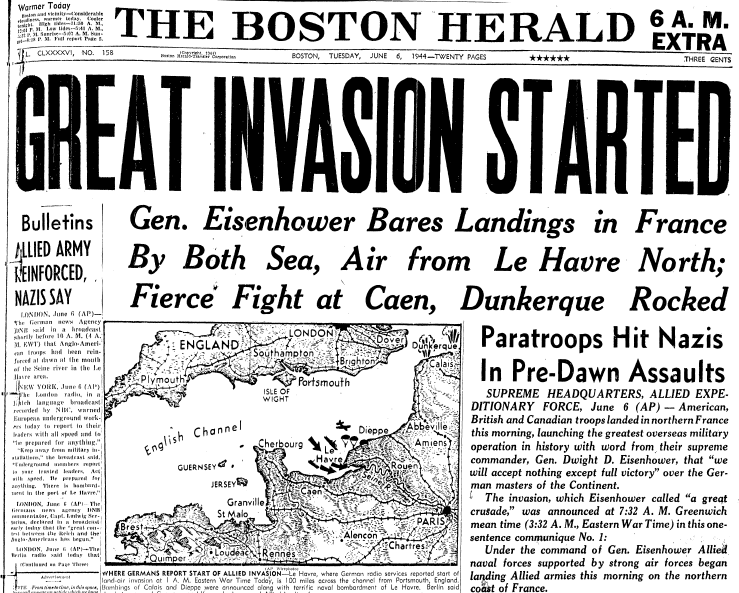
During the months of D-Day preparations, the actual landings, and even continuing into the first weeks of battles, there was an equally important operation taking place by the name of “Operation Fortitude.” This two-part operation of “Fortitude North” and “Fortitude South” was one of the supreme acts of deception of all time.
It took a while for all the details to be revealed, but this 1965 newspaper article presents a very good review of this “secret of D-Day.”
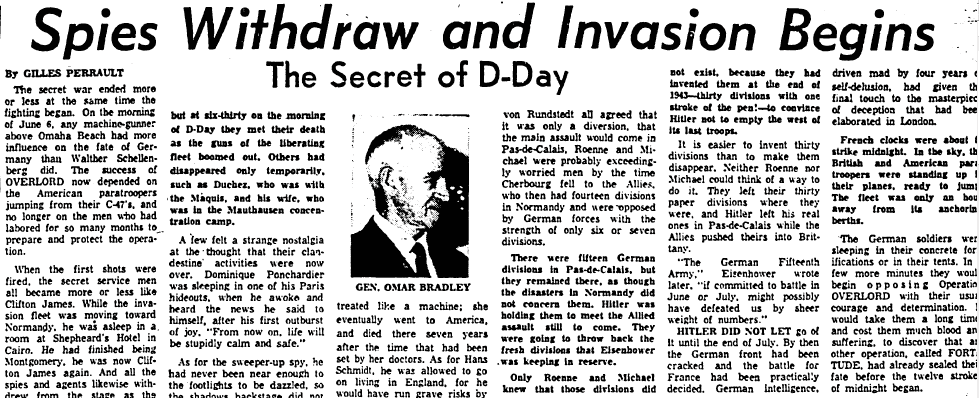
Four years later, this 1969 newspaper article again focuses on the use of deception that paved the way for the Allies’ success at D-Day. This historical news article reports the reminiscences of General Omar Bradley, who commanded the American troops attacking the Normandy coast. Bradley related not only his firsthand memories regarding the D-Day invasion, but also the big deception that was created to convince the Axis powers that the actual invasion was still coming at Pas de Calais—and that the Normandy landings were actually just a distraction.
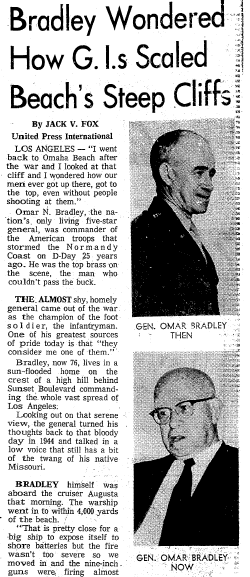
The incredible fighting, bravery, and staggering losses of D-Day have been frequently reported, but I found a 1979 article on this subject that was particularly interesting to me. It was written by Robert E. Cunningham, a U.S. Army Captain, and relates his experiences while landing at Omaha Beach that fateful day. His story is almost too intense to read.
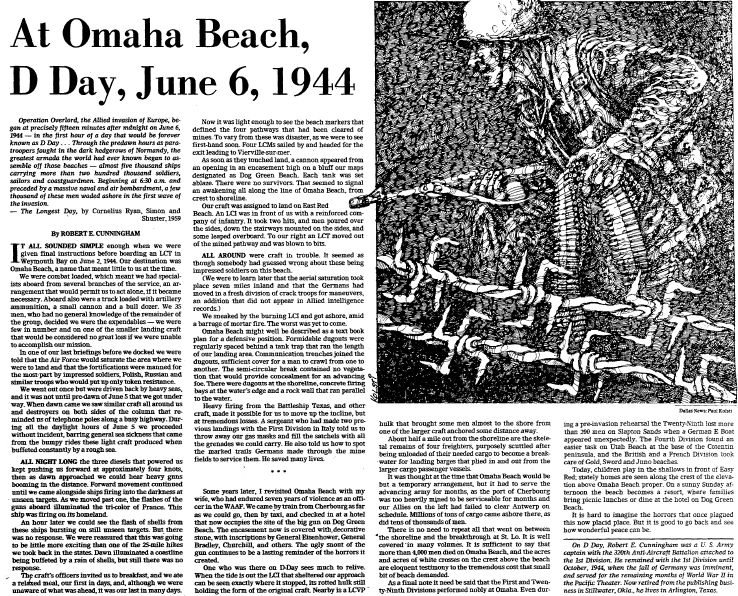
Several years ago, my family was on vacation in Europe. We were in France, my mother was driving and my father was dozing in the car. My mom saw a sign for “Omaha Beach” and decided it would be a nice surprise to go there for my dad. My father didn’t wake up until we parked the car. He was incredibly shocked to see where we were as he sat in the car looking out at the acres and rows of crosses. For quite some time he refused to leave the car. Finally he joined us as we walked the now silent beach, seeing the cliffs, concrete pillboxes, old rusting guns, and shipwrecks still in the surf. It was later, while walking hand-in-hand with his family through those crosses that he said, in a voice that was only a whisper, that he had spent the first months after D-Day on graves registration detail and it was the worst duty he had ever pulled.
The War continued for almost a year after D-Day with fierce fighting all across Europe (and in the Pacific for even longer), as shown in this 1944 newspaper with a full page of articles covering battle after battle being waged from France and Italy to the Pacific.
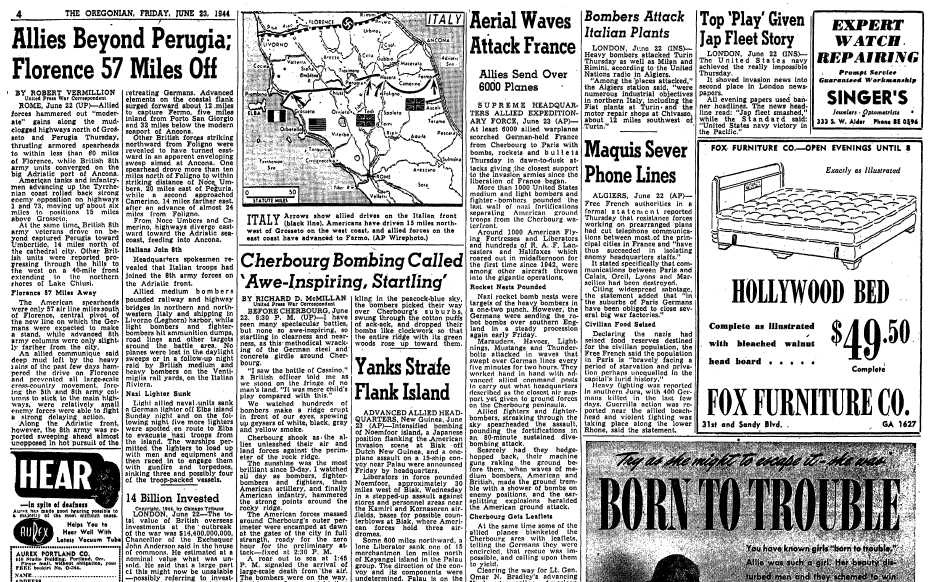
Now it is 70 years after D-Day and the successes of that fateful day continue to be recognized across Europe as communities everywhere celebrate their liberation. As a matter of fact, just a couple of months ago I was contacted by a woman who is coordinating the celebration of the liberation of the town of Dinan, France, which was accomplished by the forces of the 83rd Infantry. She was seeking photographs that might be a part of that town’s celebration. As any good family historian and genealogist would do, I was happy to share what I had for the display during their celebration this summer.
The small leather satchel in this photograph is the one my father carried across Europe during the fighting. He carefully noted each town he found himself in, one of which was Dinan.
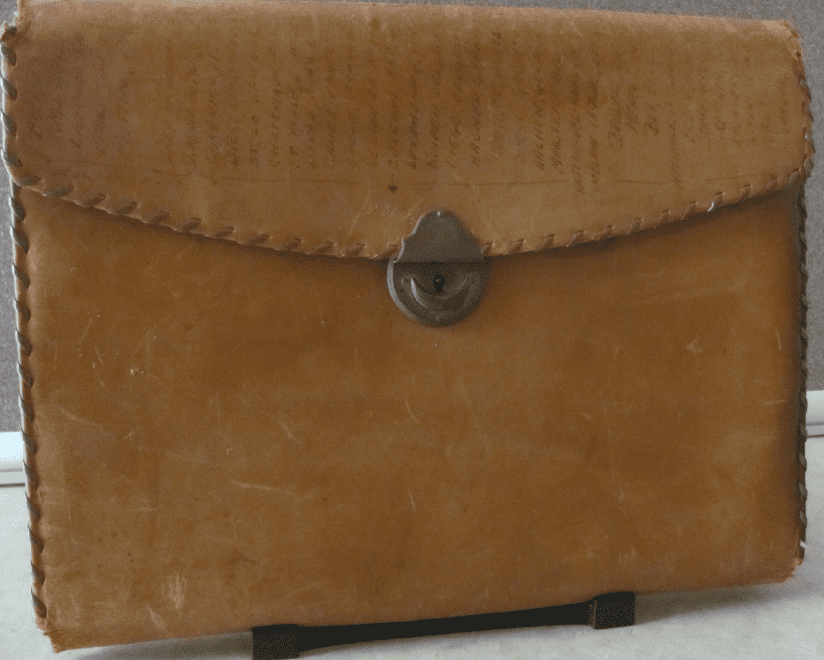
As my contact in Dinan said to me: “Oh my, Scott, this satchel tells a story all by itself.”
I can only add my thanks to all who served our country in WWII and especially those who fought on the beaches of Normandy 70 years ago on D-Day.
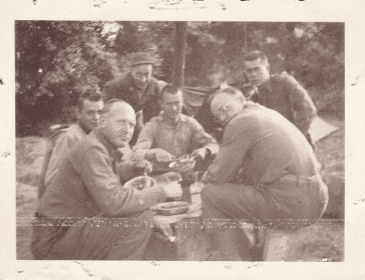
Do you have any D-Day veterans in your family or your family tree? I’d like to hear about them if you do; please post something in the comments section below.
